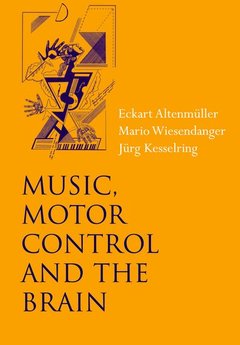Music, Motor Control and the Brain
Langue : Anglais
Coordonnateurs : Altenmüller Eckart, Wiesendanger Mario, Kesselring Jurg

The motor actions that can be witnessed as a virtuoso musician performs can be so fast, so accomplished, so precise, as to seem somehow superhuman. The musician has to produce the movements, monitor those they have already made and the subsequent result, co-ordinate their hands, fingers, eyes, and perhaps throat and diaphragm. These achievements are of course the product of hundreds, even thousands of hours of practice - playing scales, studies, time and time again. But those hours of practice by no means guarantee that great musicianship will result. This technical prowess has to be combined with a range of other, perhaps, less tangible qualities. This book explores the secrets of musical virtuosity. It presents a comprehensive account of music and motor cognition, examining the neural basis of music making - our understanding of which is just starting to be enhanced by brain imaging. It considers the effect on our brains of prolonged music making. It explores the motor processes across a range of instruments (vocal, string, wind, percussion) and within different performance situations. It also considers what happens when things start to go wrong - why motor problems occur in so many professional musicians in later life, and the possible therapies for such problems. Music is a topic of considerable interest within the brain sciences. With contributions from leading psychologists, neuroscientists, and neurologists, this book makes a unique contribution to our understanding of music and the brain.
Part 1: History. 1. Historical increases in expert music performance skills: optimising instruments, playing techniques and training. Part 2: Psychology. 2. From cognition to action. 3. The nature of memory for music performance skills. 4. Musical synchronization. Part 3: Movement analysis. 5. Hand movements and musical performance. 6. Movement analysis in pianists. 7. Fingering and bowing in violinists: a motor control approach. 8. Movements and analysis of drumming. Part 4: Representation in the Brain. 9. Brain structures of musicians: executive functions and morphological implications. 10. The motor representation in pianists and string players. 11. Brain activation during piano playing. 12. Brain activation during string playing. 13. 'Singing in the (b)rain': cerebral correlates of vocal music performance in humans. 14. Sensory motor networks in singing and speaking: a comparative approach. 15. The role of inhibition in the motor control of finger function. Part 5: Apollo's curse - the loss of motor control in musicians. 16. The end of the song? Robert Schumann's focal dystonia. 17. Epidemiology, phenomenology and therapy of musician's cramp. 18. The neurophysiology of focal hand dystonia in musicians. 19. The development of focal dystonia in musicians as a consequence of maladaptive plasticity: implications for intervention. 20. Music performance anxiety.
After graduating in Medicine and Music Eckart Altenmüller held a postdoctoral position in the department of Clinical Neurophysiology in Freiburg where he carried out research into brain activation during auditory processing of music and learning of fine motor skills. He received his clinical training in Neurology at the Department of Neurology at the University of Tübingen (Head of the Department Prof. Dr. J. Dichgans). Since 1994 he is a chair and director of the Institute of Music Physiology and Musicians' Medicine. He continues research into movement disorders in musicians and into motor and sensory learning in musicians. In his outpatient clinic he sees 500 musicians a year, mostly suffering from movement disorders such as focal dystonia, focal tremor or from chronic pain syndromes. Currently 270 patients suffering from musicians' cramp are under his supervision. During the last ten years he received 20 grants from the German Research Society (DFG).
Date de parution : 07-2006
Ouvrage de 344 p.
17x24.5 cm
Date de parution : 07-2006
Ouvrage de 344 p.
17.5x25.2 cm
Thèmes de Music, Motor Control and the Brain :
© 2024 LAVOISIER S.A.S.



